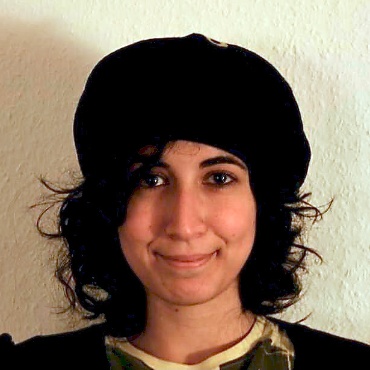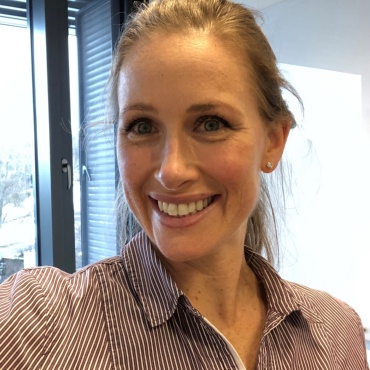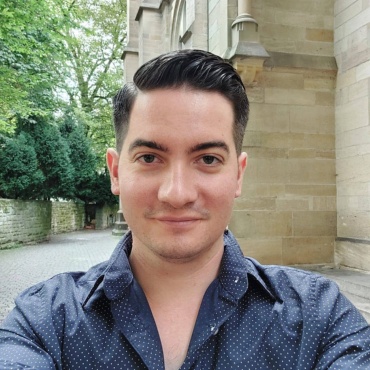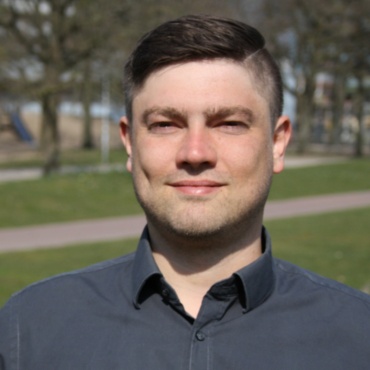About the Session Contributors
Tabea Berberena
is the Scientific Coordinator of the teaching and learning forum RISING (Reflecting Intelligent Systems in the Next Generation) at the Department of Teaching and Learning with Intelligent Systems at the University of Stuttgart, Germany, since November 2020. Her goal is to bring methods for critically reflecting societal impacts of intelligent systems into the university context. She received a BA in Psychology from Nyack College, New York City (2007) and her MA in Educational Psychology from Hunter College, New York City (2011), where her focus was on culturally responsive teaching and ethnic identity awareness. Since 2016, she is working as researcher and lecturer at the University of Stuttgart, Germany, at the Institute of Educational Science. Within teaching, she focused on pre-service teacher education, research methods, teaching methods, integration, heterogeneity, diversity as well as the analysis of teaching and learning processes. Her research interests include self-reflection, teacher education, inter- trans culturalism, implicit bias/stereotypes, cognitive dissonance, artificial intelligence as well as cultural diversity. She is also affiliated with the Max Planck Research Group “Organizational Leadership and Diversity” at the Max Planck Institute for intelligent Systems in Stuttgart, Germany, where her research focuses particularly on approaches to reflecting diversity in humans and machines.
Maria Wirzberger
is a tenure-track professor for teaching and learning with intelligent systems at the University of Stuttgart, where she has headed the respective department since March 2020. As a cognitive psychologist with strong connections to computer science, her research activities are characterized by an interdisciplinary perspective. Prior to her appointment at the University of Stuttgart, she led the development of an AI-supported attention training at the Max Planck Institute for Intelligent Systems in Tübingen. At the interface of AI and education, she is a member of the board of directors of the Artificial Intelligence Software Academy (AISA) and involved in several externally funded projects at the University of Stuttgart. With the goal of critically reflecting on the societal impact of AI-based systems, she is the spokesperson of the "Interchange Forum for Reflecting on Intelligent Systems" (IRIS) research focus and a member of the "Platform of Reflection" of the Cluster of Excellence "Data-Integrated Simulation Science" (SimTech). Furthermore, she represented the University of Stuttgart and Cyber Valley with this focus in the Commission Expert Group "AI and Data in Education and Training". In May 2022, she was accepted as a fellow at the Elisabeth Schiemann Kolleg of the Max Planck Society.
Sierra Kaiser
is the scientific coordinator for the SRF IRIS.
Félicie Kohlrausch
is the Public Engagement Coordinator for SRF IRIS.
Kevin Baum
(M.A. in Philosophy, M.Sc. in Computer Science) is a Ph.D. candidate at Saarland University and a researcher within the Explainable Intelligent Systems project funded by the VolkswagenStiftung (http://www.eis.science) and a research associate within the Center for Perspicuous Computing funded by the DFG (https://www.perspicuous-computing.science). Together with Sarah Sterz, he developed the award-winning lecture Ethics for Nerds (https://informationethics.ca/index.php/irie/article/view/484) and is co-chair of the university’s committee for the ethics of security-related research (https://www.uni-saarland.de/verwaltung/wissenschaftliche-integritaet/sicherheitsrelevante-forschung.html).
Jonas Wahl
(Ph.D. in Mathematics) is a postdoctoral researcher on Causality in Complex Systems within the ERC project CausalEarth at TU Berlin (https://climateinformaticslab.com) and a permanent guest researcher at the DLR institute of Data Science in Jena.
Torsten Becker
(Second state examination in History and Religious Studies) is a consultant in the digital teaching competence team at the Saarland State Institute for Pedagogy and Media and a lecturer at Saarland University.
Lara C. Roll
(Ph.D. in Industrial and Organizational Psychology) is a Marie Curie Fellow at KU Leuven (Belgium) and an Extraordinary Professor at North-West University (South Africa).
Sarah Sterz
(M.A. in Philosophy, B.Sc. in Computer Science) is a Ph.D. candidate at Saarland University and a research associate within the Center for Perspicuous Computing funded by the DFG (https://www.perspicuous-computing.science). Together with Kevin Baum, she developed the award-winning lecture Ethics for Nerds (https://informationethics.ca/index.php/irie/article/view/484) and is a member of the ethical review board of the Faculty of Mathematics and Computer Science (https://erb.cs.uni-saarland.de/).
Timo Speith
(B.A. in Philosophy, M.Sc. in Computer Science) is a research associate at the University of Bayreuth and a researcher within the Explainable Intelligent Systems project funded by the VolkswagenStiftung (http://www.eis.science) and within the Center for Perspicuous Computing funded by the DFG (https://www.perspicuous-computing.science).
Miriam Klopotek
is an Independent Junior Research Group Leader for Many-Body Simulations and Machine Learning at the University of Stuttgart.
Siegmar Otto
(Ph.D.) is a professor of Sustainable Development and Change at the University of Hohenheim. With his background in psychology and media science, he researches several facets of sustainable digital change. In this quest, he combines his strong research record on sustainable behaviour and motivation with the domain of human-machine-interaction. He is also an expert on evaluation research and evidence-based policy consulting. He has been principal investigator of several research projects. Just recently, he has been leading a BMBF-funded collaborative project where he and his team successfully developed an outcome indicator test to assess individual competencies in sustainable development for the sustainability monitoring of the German government. He has published numerous articles in high-ranking indexed journals (ORCID: 0000-0001-9645-2586), and his h index is 21 in Google scholar.
Curtis Runstedler
is an IRIS postdoctoral research fellow based in the Department of English Languages and Literatures at the University of Stuttgart. His current research examines literary depictions of intelligent systems in contemporary literature and the function of these narratives. He was awarded his Ph.D. in Medieval Literature at Durham University in 2018 and was previously a Teach@Tübingen fellow at Tübingen University.
Benjamin Schwarz
(M.A.) works at the Institute for Multimedia and Interactive Systems at the University of Lübeck. His research focuses on the role of design in transformative scientific projects. His doctoral project in the field of Designwissenschaft at the University of Vechta is dedicated to reflection and options for action on the ethics of holistic systems.
Tim Schrills
(M.Sc.) works at the Institute for Multimedia and Interactive Systems at the University of Lübeck. His research focuses on the interaction between humans and intelligent systems in medical diagnostics and personalized therapy. He investigates how these systems can be made trustworthy and comprehensible.
Thomas Franke
is a professor of engineering psychology and cognitive ergonomics at the University of Lübeck. He received his Ph.D. in Psychology in 2014 from Chemnitz University of Technology. In his research, he is particularly interested in understanding and supporting resource regulation in human-technology environments. Herein he focuses on theory-oriented research, method development and topics related to user diversity and effects of interface design.
Tyne Daile Sumner
is an Australian Research Council Postdoctoral Research Fellow in English and Theatre Studies at the University of Melbourne. Her interdisciplinary research explores the ways that literary texts respond to, resist, explain and shape cultures of surveillance. She also examines surveillance as a cultural practice in art, performance, and film. Her other research is in the areas of digital humanities, Australian Literature, cultural studies, lyric studies, and typography in literary texts. She’s published articles and chapters with Australian Literary Studies, Bloomsbury, Australian Humanities Review, Digital Culture and Education, Cordite Poetry Review, and have articles forthcoming with Surveillance & Society and Journal of Intercultural Studies. Her monograph is Lyric Eye: The Poetics of Twentieth-Century Surveillance (Routledge 2021) and is an Associate Editor with Philip Morrissey of Lionel Fogarty Selected Poems 1980-2017 (re.press 2017). She has other research forthcoming in several major compendiums to the digital humanities and a chapter forthcoming in the Cambridge Companion to David Bowie, edited by Denis Flannery.
Tommaso Caselli
is an Assistant Professor at the University of Groningen.
Simon Cullen
is an Assistant Professor in the Department of Philosophy at Carnegie Mellon University.
Nick Byrd
is an Assistant Professor at the Stevens Institute of Technology.
Philipp Chapkovski
is a scholar at the Migration, Integration, Transnationalization department at WZB Berlin. Using experimental methods, he studies how people strategically avoid information about their partner when they make altruistic decisions. His other project examines how small-scale private investors change their behavior while using mobile apps.
Neil Thomason
of the Department of Philosophy at The University of Melbourne.
Lukas Erhard
is a research assistant at the Interchange Forum for Reflecting on Intelligent Systems (SRF IRIS). In this context, and as part of the Computational Social Science (CSS) chair, he sits at the intersection of social and computer sciences. He works on integrating machine learning techniques into the social science research process. Since his master’s program, his methodological focus has been large-scale data processing, statistics, machine learning, natural language processing, and social network analysis. His ongoing dissertation analyzes the influence of (social) media on the opinion-formation process as well as the attitudes of individuals
Raphael Heiberger
is a Tenure-Track Professor at the Institute for Social Sciences of the University of Stuttgart. He is head of the newly founded chair on Computational Social Science. He received his Ph.D. from the University of Bamberg (Germany) and was visiting scholar at UCLA and a Fulbright Fellow at UC Berkeley. He is a permanent member of the McFarland Lab at Stanford University. Besides various aspects of Social Network Analysis (dynamics, statistical modeling, theory), his research interests focus on Natural Language Processing, Machine Learn ing, and, more generally, the application of computational methods on social phenomena like careers, polarization, or inequality
Anna Thaler
is a Research Assistant with the Cognitive Systems Group working on "Digitale Kulturen der Lehre entwickeln (DiKuLe)" founded by "Stiftung Innovation in der Hochschullehre" with the Faculty of Information Systems and Applied Computer Sciences at the University of Bamberg.
Ute Schmid
is head of the chair for cognitive systems at the University of Bamberg. She holds a diploma in psychology and a diploma in computer science, both from Technical University Berlin (TUB), Germany. She received her doctoral degree (Dr. rer.nat.) in computer science from TUB in 1994 and her habilitation in computer science in 2002. From 1994 to 2001 she was an assistant professor (wissenschaftliche Assistentin) at the Methods of AI/Machine Learning group, Department of Computer Science, TUB. Afterwards she worked as a lecturer (akademische Rätin) for Intelligent Systems at the Department of Mathematics and Computer Science at the University Osnabrück and was a member of the Cognitive Science Institute. In 2004 she became a professor of Applied Computer Science/Cognitive Systems at the University of Bamberg. In 2022 Ute Schmid was elected as EurAI fellow. She is a fortiss research fellow and member of the Steering Committee of the IBM fortiss Center for AI. Since 2020 she is a member of the board of directors of the Bavarian Institute of Digital Transformation. Ute Schmid is also a member of the Bavarian AI Council (Bayerischer KI-Rat). Furthermore, since 2020 Ute Schmid has been head of the Fraunhofer IIS project group Comprehensible AI (CAI). Ute Schmid dedicates a significant amount of her time to measures supporting women in computer science and to promoting computer science as a topic in elementary, primary, and secondary education. She won the Minerva Gender Equality Award of Informatics Europe 2018 for her university. For many years, Ute Schmid has been engaged in educating the public about artificial intelligence in general and machine learning, and she gives workshops for teachers as well as high-school students about AI and machine learning (see Talks). For her outreach activities, she has been awarded the Rainer-Markgraf-Preis 2020.
Abstracts
| Description | Title |
|---|---|
| Session 1: Tabea Berberena and Maria Wirzberger | Embedding reflective learning opportunities in teaching about intelligent systems |
| Session 3: Tyne Daile Sumner | Pixel, Partition, Persona: Machine Vision and Facial Recognition in Contemporary Speculative Fiction |
| Session 4: Tommaso Caselli | We Need Communities To Develop Reliable Systems |
| Session 2: Kevin Baum, Jonas Wahl, Torsten Becker, Lara C. Roll, Sarah Sterz, and Timo Speith | On the Role of the Enablers of Society-Wide Critical Reflection on Intelligent Systems |
| Session 2: Miriam Kloptek | Reflection on intelligent systems: A physicist’s thoughts from the study of complex systems |
| Session 1: Félicie Kohlrausch | What is the purpose of reflecting on intelligent systems in public and who is the target audience? |
| Session 2: Siegmar Otto | Biases and sustainability in intelligent systems. Uncovering (unintended) influences of developers’ demographics and motives on intelligent systems. |
| Session 3: Curtis Runstedler | Literary Narratives as Tools for Critical Reflection upon Intelligent Systems |
| Session 4: Anna Thaler and Ute Schmid | Enriching Intelligent Tutoring Systems with Methods of Explainable Artificial Intelligence – a Research Proposal |
| Session 3: Benjamin Schwarz, Tim Schrills, Thomas Franke | Experiencing Ethics and Values in the Design Process of AI-enabled Medical Devices and Software |
| Session 4: Simon Cullen, Nick Byrd, Philipp Chapkovski, and Neil Thomason | Experiments In Reflective Equilibrium Using The Socrates Platform |
| Session 4: Lukas Erhard and Raphael Heiberger | Machine Learning in Sociology: a methodological Reflection - Lukas Erhard and Raphael Heiberger |






